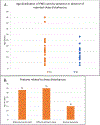Sleep disturbances in Phelan-McDermid syndrome: Clinical and metabolic profiling of 56 individuals
- PMID: 37198960
- PMCID: PMC10330540
- DOI: 10.1111/cge.14361
Sleep disturbances in Phelan-McDermid syndrome: Clinical and metabolic profiling of 56 individuals
Abstract
Phelan-McDermid Syndrome (PMS) is caused by deletions at chromosome 22q13.3 or pathogenic/likely pathogenic SHANK3 variants. The clinical presentation is extremely variable and includes global developmental delay/intellectual disability (ID), seizures, neonatal hypotonia, and sleep disturbances, among others. This study investigated the prevalence of sleep disturbances, and the genetic and metabolic features associated with them, in a cohort of 56 individuals with PMS. Sleep data were collected via standardized observer/caregiver questionnaires, while genetic data from array-CGH and sequencing of 9 candidate genes within the 22q13.3 region, and metabolic profiling utilized the Biolog Phenotype Mammalian MicroArray plates. Sleep disturbances were present in 64.3% of individuals with PMS, with the most common problem being waking during the night (39%). Sleep disturbances were more prevalent in individuals with a SHANK3 pathogenic variant (89%) compared to subjects with 22q13.3 deletions of any size (59.6%). Distinct metabolic profiles for individuals with PMS with and without sleep disturbances were also identified. These data are helpful information for recognizing and managing sleep disturbances in individuals with PMS, outlining the main candidate gene for this neurological manifestation, and highlighting potential biomarkers for early identification of at-risk subjects and molecular targets for novel treatment approaches.
Keywords: 22q13 deletion syndrome; PMS; Phelan-McDermid syndrome; SHANK3; sleep disturbance.
© 2023 The Authors. Clinical Genetics published by John Wiley & Sons Ltd.
Conflict of interest statement
Conflict of Interest
The authors have no conflict of interest to declare.
Figures

References
-
- Angriman M, Caravale B, Novelli L, Ferri R, & Bruni O (2015). Sleep in children with neurodevelopmental disabilities. Neuropediatrics, 46(03), 199–210. - PubMed
-
- Bozdagi O, Sakurai T, Papapetrou D, Wang X, Dickstein DL, Takahashi N, Kajiwara Y, Yang M, Katz AM, Scattoni ML, Harris MJ, Saxena R, Silverman JL, Crawley JN, Zhou Q, Hof PR, & Buxbaum JD (2010). Haploinsufficiency of the autism-associated Shank3 gene leads to deficits in synaptic function, social interaction, and social communication. Molecular Autism; Mol Autism, 1(1), 15. https://10.1186/2040-2392-1-15 - DOI - PMC - PubMed
-
- Carter KA, Hathaway NE, & Lettieri CF (2014). Common Sleep Disorders in Children. American Family Physician; Am Fam Physician, 89(5), 368–377. - PubMed
Publication types
MeSH terms
Supplementary concepts
Grants and funding
LinkOut - more resources
Full Text Sources
Medical

